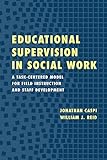Educational Supervision in Social Work : A Task-Centered Model for Field Instruction and Staff Development / William J. Reid, Jonathan Caspi.
Material type: TextPublisher: New York, NY : Columbia University Press, [2002]Copyright date: ©2002Description: 1 online resource (274 p.)Content type:
TextPublisher: New York, NY : Columbia University Press, [2002]Copyright date: ©2002Description: 1 online resource (274 p.)Content type: - 9780231108522
- 9780231528436
- 361.3/071
- online - DeGruyter
- Issued also in print.
| Item type | Current library | Call number | URL | Status | Notes | Barcode | |
|---|---|---|---|---|---|---|---|
 eBook
eBook
|
Biblioteca "Angelicum" Pont. Univ. S.Tommaso d'Aquino Nuvola online | online - DeGruyter (Browse shelf(Opens below)) | Online access | Not for loan (Accesso limitato) | Accesso per gli utenti autorizzati / Access for authorized users | (dgr)9780231528436 |
Browsing Biblioteca "Angelicum" Pont. Univ. S.Tommaso d'Aquino shelves, Shelving location: Nuvola online Close shelf browser (Hides shelf browser)

|

|

|

|

|

|

|
||
| online - DeGruyter The China Threat : Memories, Myths, and Realities in the 1950s / | online - DeGruyter The Columbia Guide to the Cold War / | online - DeGruyter Human Services Management : Organizational Leadership in Social Work Practice / | online - DeGruyter Educational Supervision in Social Work : A Task-Centered Model for Field Instruction and Staff Development / | online - DeGruyter States of War : Enlightenment Origins of the Political / | online - DeGruyter Margaret Fuller, Critic : Writings from the New-York Tribune, 1844-1846 / | online - DeGruyter Human Behavior and Social Environments : A Biopsychosocial Approach / |
Frontmatter -- Contents -- Preface -- 1. A New Model of Educational Supervision -- 2. A History of Educational Supervision in Social Work -- 3. Principles of Effective Instruction -- 4. The Supervisory Relationship -- 5. The Person of the Supervisor -- 6. Preparing for Supervision Beginnings and Endings -- 7. The Development and Basic Principles of TCS -- 8. The Social and Direct Teaching Functions of TCS -- 9. Target Goals -- 10. Tasks, Obstacles, and Contracting -- 11. Task Review -- 12. Applications of TCS -- Appendix: TCS Guidelines -- References -- Name Index -- Subject Index
restricted access online access with authorization star
http://purl.org/coar/access_right/c_16ec
This book provides a comprehensive examination of instructional supervision and introduces the Task-Centered Model for Educational Supervision (TCS). It begins by reviewing the history of educational supervision in social work and principles of effective teaching practices in the field. While theories about the principles and purposes of educational supervision abound, it has proven difficult to translate these ideas into a coherent model of supervisory practice. Educational Supervision in Social Work answers that need, presenting in detail TCS, an ordered series of discrete activities that supervisors and supervisees follow during and between supervision meetings. Designed to promote the continuous attainment of learning and practice objectives, TCS accommodates new models of field instruction, addresses common accountability concerns in social work supervision, and teaches practitioners how to be self-initiating and evaluative. Focusing on the practical implementation of TCS, Caspi and Reed have included detailed case vignettes throughout the book that provide concrete examples of putting theory into practice. Both supervisors of interns and staff as well as supervisees will find TCS a helpful tool in the supervisory process.
Issued also in print.
Mode of access: Internet via World Wide Web.
In English.
Description based on online resource; title from PDF title page (publisher's Web site, viewed 02. Mrz 2022)


